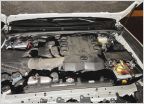-
Welcome to Tacoma World!
You are currently viewing as a guest! To get full-access, you need to register for a FREE account.
As a registered member, you’ll be able to:- Participate in all Tacoma discussion topics
- Communicate privately with other Tacoma owners from around the world
- Post your own photos in our Members Gallery
- Access all special features of the site
Toluene and Xylene
Discussion in 'Technical Chat' started by soggyBottom, Dec 31, 2018.
Page 1 of 2
Page 1 of 2


 Sound effect switch in cab? Wiring?
Sound effect switch in cab? Wiring? Dometic Hardwire Kit Install - In Bed Side Pocket Above Wheel Well - 2nd Gen AC
Dometic Hardwire Kit Install - In Bed Side Pocket Above Wheel Well - 2nd Gen AC ARB CKMA12 Simple Wiring
ARB CKMA12 Simple Wiring Another Dual battery question…
Another Dual battery question…





































































